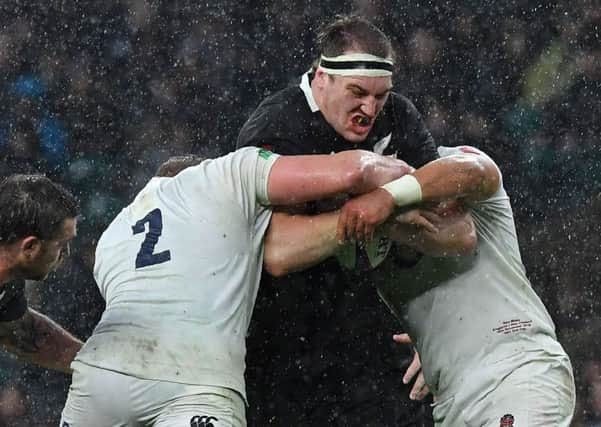Eddie Jones' numbers game adds up to another England defeat by New Zealand


Jonny May, the England wing, used the e-word, too, in the aftermath of the nearly-but-not-quite, exciting-frustrating 16-15 loss to the All Blacks at a rain-lashed Twickenham on Saturday. “I am convinced we’ve got more growth in us than them [New Zealand], between now and the World Cup,” May said. “We are at the start of our season, we are missing some players and we are only going to gain experience. My feeling is that we have played in tougher games and it was a game we could have won.”
Could have, but didn’t. And there is many a team, as May himself honestly acknowledged, who have muttered that contradictory statement after a beating by the All Blacks. In this match, given a tremendous start by Chris Ashton’s try in 111 seconds, what were the manifestations of England’s supposed shortage of caps? Owen Farrell, the captain, twice chose lineouts over kicks at goal, immediately after Beauden Barrett’s drop goal cut England’s lead to 15-13 in the 47th minute. The decision was informed by the rampaging try England had scored from a lineout maul early in the second quarter to lead 15-0 and set Twickenham rocking. Farrell is a veteran of 66 Tests and he consulted with Maro Itoje and George Kruis, who have both been about for more than a bit.
Advertisement
Hide AdAdvertisement
Hide AdAnd it might have paid off if Kyle Sinckler had not dropped the ball as he charged for the All Blacks’ line. The 25-year-old Harlequin began the second half as if someone had kicked him on the shins in the players’ tunnel. He was snarling and looking for a fight. Which was fine, up to a point, as England’s aggression had already carried them a long way. But it seemed to feed into Sinckler missing the focus he really needed in the most important moment.
Some may feel Jones’s numbers game is a diversion; a mask for deficiencies in playing or coaching. Sam Underhill, playing his seventh Test, displayed commendable maturity after having what could have been one of the most dramatic winning tries in Twickenham history chalked off for a marginal offside call against Courtney Lawes, playing his 68th. “If the referee says the grass is pink then the grass is pink,” Underhill commented. When Farrell’s co-captain Dylan Hartley went off at half-time, he took 95 caps with him. A coach can plan for these events, but never fully control them. New Zealand subsequently destroyed England’s lineout, disrupting five throws from Hartley’s replacement Jamie George. Was that experience or just talent? The All Blacks were not fussed, slinking away to face Ireland next, as winners over England for the 15th time in the last 16 meetings.